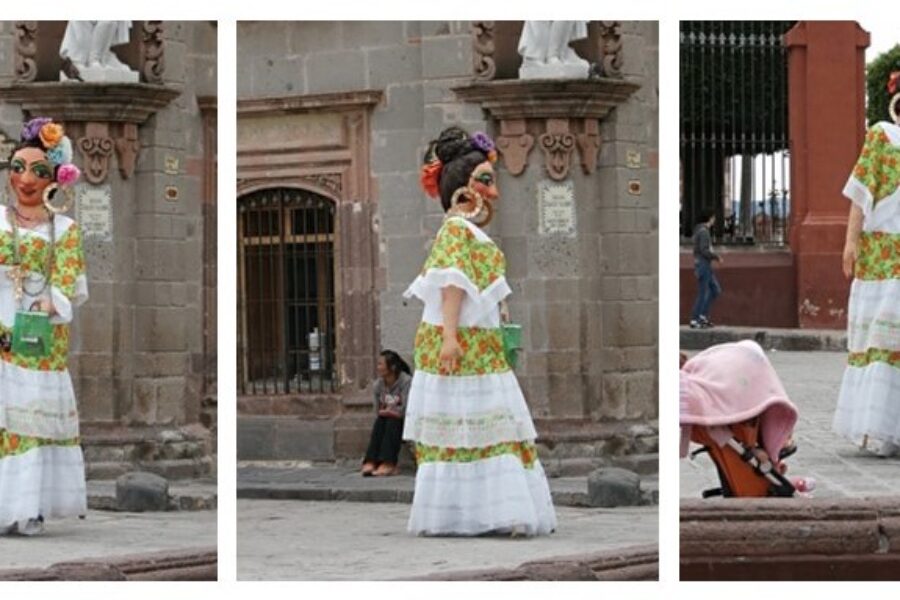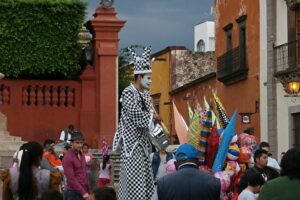Memories
Stepping out into the streets of San Miguel, I look and listen for the remembered. The high whistle whine of the knife sharpener. The crow of the rooster. Roof dogs barking. The toll of the bells. The explosion of fireworks. The rhythms of the mariachi. The melodious notes of the San Miguel Boys. I remember the haunting tale of La Llorona, sung by the mariachi, and I listen for it still.
Things are the same, and things have changed. The streets are as they were, cobblestones of ancient days, too easy to turn an ankle, always looking down. Still the occasional stumble.


The constant rains are new and unexpected in their duration, as is the coolness of the air they bring with them. We now have umbrellas, and Michael even carries one in his pocket. The buildings on the streets are the same. Some have changed names. Some have closed. To my dismay, there is a Starbucks on the northwest corner of the Jardin. La Palapa, the hot dog tent, is still here, and we lunch in the rain.


Ole Ole, the fajita restaurant under the sign of the black bull on Loretta Street, is closed. It has been for five years, and I am truly saddened. We look for and can’t find the street vendor selling hamburgesa which we loved so many years ago—loved so much that I requested I spend my birthday there in the cold February evening of 2005, munching my burger, eating my chips and drinking my Coca-Cola on the steps of La Paroqquia. I hope we are mistaken about his absence, and he has just changed locations.
Sam Seaman
We walk forever, tracing the path I took years ago when I commuted three times a week by foot from one end of San Miguel to the other to take art lessons from the ex-pat Englishman, Sam Seaman. We can’t find him now; he has seemingly disappeared into the mist of the Mexican hills. I marvel at how far I walked three times a week, on such narrow sidewalks, on seemingly unsafe (Fort Worth unsafe) back streets.
Earnest in my will to learn, I remember saying, “Pretend I know nothing. Start from scratch.” And so he did, showing me how brown and blue made black and telling me that most of the time, you start from background to foreground in a painting—intuitive, I think—but because of the window with bars that I desired to paint, that I must do the opposite. I remember those bars. I believe I labored too long.

Shopping
We walk a mile and a half to the huge Mega Market that sells everything from tires to quail eggs—something I can only find at Central Market at home— and wine from Spain that is so cheap I worry that it may taste like lighter fluid. It doesn’t. We look for white beans. In the frijole section, I only find pinto and black beans. Michael heads to another aisle and comes back with a can. After a taxi ride home, while I am putting away our purchases, I pick up the can of white beans and notice the can says elote blanco—I look it up—white corn!


We walk past the Jardin, retracing remembered steps to the Biblioteca, and gather information on a tour to Guanajuato. We look for a small grocery store in Centro—we can’t remember the name or the street—discovered late on our last trip eight years ago, and after many missed steps due to broken memories, we happen on Bonanza—an appropriate name. They have hearts of palm, Chinese noodles, an assortment of Maille mustard (my favorite brand) from France, and tucked in the back, I find frijoles blanco—dried—ready for my large pot at Casa Jacaranda.
We stop and sit on one of the many benches under the sculptured trees of the Jardin, starring at La Parroquia, remembering trips past, trips present, and dreaming of trips future.




I look at Michael, “I’m so glad we are here—but I’m also sorry it is only for two weeks.” He nods in agreement.
La Llorona
The Story – (There are several versions–all tragic)
Once there was a widow who wished to marry a rich nobleman. However, the nobleman did not want to raise another man’s children, and he dismissed her. The widow was determined to have the nobleman for her own, so the widow drowned her children to be free of them. When she told the nobleman what she had done, he was horrified and would have nothing more to do with her. As she left him, the widow was overcome by the terrible crime she had committed and went to the river, looking for her children. But they were gone. She drowned herself, and her spirit was condemned to wander the waterways, weeping and searching for her children until the end of time.








Leave a Reply
Your email is safe with us.